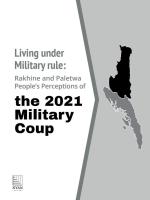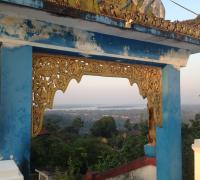How is it to live under the military coup in Myanmar?
The military coup d’état staged in Myanmar on 1 February 2021 has reversed Myanmar’s democratic transition process and led to massive popular uprisings against the military take over. Yet while people in most places of the country have gone in the streets to protest or joined the strikes of the Civil Disobedience Movement (CDM), people in Rakhine state and the Paletwa region of Chin State seem to have remained silent.
In the early days after the coup the Arakan National Party (ANP) – the largest political party in Rakhine State – also agreed to join the new military State Administrative Council and the Arakan Army (AA) engaged in negotiations with the military. These moves led many people in Yangon and other places to assume that especially the Rakhine people were supporting the military coup and that they were enjoying special privileges.
This paper challenges these assumptions about the Rakhine’s perceptions of the military coup. Based on interviews with Rakhine people and Chin residents of Paletwa region, the paper argues that the low level of anti-coup protests does not mean that people support the military take over. Quite the contrary. They expressed strong resentment to military rule. However, they held back on protesting either due to fear of military counter-violence or in the case of the Rakhine because they were very critical of the previous NLD (National League for Democracy) government, and therefore were reluctant to take sides.
This stance should be understood against the background of the past five years of armed conflict and military atrocities in Rakhine state, where people have felt ignored and neglected by the NLD, and its leader Aung San Suu Kyi. This feeling of neglect was also found among the Rohingya Muslim minority in Rakhine state and the refugee camps in Bangladesh. The Chins that were interviewed were much more supportive of the NLD, but tight control of movement and early crack downs on protesters in Paletwa meant that people here were inhibited from organising and protesting in public.
The paper also explores what the coup has meant for everyday livelihood and security in the areas under study and concludes with some reflections on people’s shared aspirations for a future federal democracy.
This paper is also available in Burmese.
This research paper was written by researchers from the Nyan Corridor who wish to remain anonymous due to the current political situation. The English version was edited with assistance from DIIS senior researcher Helene Maria Kyed.
Feel free to communicate with Nyan Corridor through nyan.corridor@protonmail.com and Nyan Corridor Facebook Page
DIIS Experts



